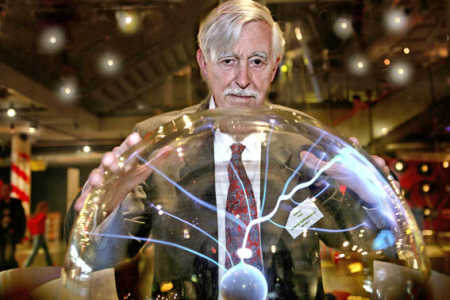
Halton Arp recognizes the study of electrified plasma as the future of astrophysics.
Photo credit: Jean-Pierre Jans, 2005.
Wal Thornhill: Cosmology in Crisis—Again!
It seems the toughest thing for scientists to grasp - that a cherished paradigm like the big bang can be wrong. The latest crisis was reported in Physorg.com on May 5th: "Study plunges standard Theory of Cosmology into Crisis." The study of dwarf companion galaxies of the Milky Way support the view that a "modified Newton dynamic" [MOND] must be adopted. “This conclusion has far-reaching consequences for fundamental physics in general, and also for cosmological theories.” One of the researchers involved said, “it is conceivable that we have completely failed to comprehend the actual physics underlying the force of gravity.”
In my news of April 21st I wrote, “we are so far from understanding gravity that we don't know the right questions to ask.” There I proposed "Electrically Modified Newtonian Dynamics," or "E-MOND," as the solution for solar system stability. However, the problem involving the dwarf companion galaxies is more fundamental to cosmology. The first problem in physics is to choose the correct concepts to apply to our observations. That determines which physical laws to apply. But that's not the end of it. We must remain aware that all laws are man-made and provisional - they are subject to modification on appeal. Historically, cosmologists have denied that electricity has any relevance in space. They have refused to consider how the laws of plasma physics might apply to their otherwise incomprehensible observations. Provisionality is a formalism to mask dogma.
Richard Feynman, lecturing his students on how to look for a new law in physics, said, “First you guess. Don't laugh; this is the most important step. Then you compute the consequences. Compare the consequences to experience. If it disagrees with experience, the guess is wrong. In that simple statement is the key to science. It doesn't matter how beautiful your guess is or how smart you are or what your name is. If it disagrees with experience, it's wrong. That's all there is to it.”
Sounds simple? Perhaps that is why we see so many proposals for new laws of physics in the mad scramble for a Nobel Prize. But the emphasis is all wrong. It encourages wild guesswork and burgeoning complexity. Complexity facilitates endless "twiddling of knobs" to match new "experience." Theories become practically unfalsifiable and unscientific - as witness, "string theory." Underlying the guesswork in cosmology is the paradigm of the big bang. A paradigm is a system of belief that tends to be taken completely for granted. The guesswork is limited to modifications that don't disturb the conviction. Questioning the established paradigm is resisted. The case of "the modern Galileo," Halton Arp, is a classic example where the big bang "disagrees with experience" - and the experience is declared to be wrong. Feynman could usefully have added that it doesn't matter how many people believe a theory, “If it disagrees with experience, it's wrong. That's all there is to it.”
Cosmology is in crisis because from the very outset the "big bang" was not science! The big bang invokes a miraculous creation of the universe from nothing. It is a misguided attempt to manufacture a creation story to complement, or compete with, the biblical Genesis story. But real science doesn't do miracles. There was no contest anyway. The biblical creation story, like those of all other ancient cultures on Earth, has nothing to do with the creation of the universe. To believe so is to misunderstand the ancient meanings of "heaven" and "earth."
A scientific, forensic investigation of mankind's earliest ideas about heaven and earth show that "heaven" was the arena of the planetary "gods," whose behavior was fearfully witnessed by our prehistoric ancestors in a catastrophic period of awful electrical splendor in the skies.














3 comments:
Hard to know what is occuring over long periods of time when all we've got is basically snapshots of distant galaxies. Scientists attempt to use gravitation to explain the formation and trajectories of all the stars and planets, but it is entirely possible to be missing something electrical. Indeed, gravitation is not known to be responsible for things such as surface tension, but electricity is. Perhaps it is "surface tension" provided by a network of interconnecting birkeland that holds the galaxies together as opposed to "wimps and MACHOS".
But still, I think that even electricity may not be a powerful enough force for that, perhaps it's something that nobody knows about.
QF,
"Hard to know what is occuring over long periods of time when all we've got is basically snapshots of distant galaxies."
Hard to know what is occuring over long periods of time when we only have a few thousand years of history and we live less than 100 years.
"But still, I think that even electricity may not be a powerful enough force for that, perhaps it's something that nobody knows about."
Possible and perhaps likely. However, only electricity can generate a magnetic field.
I guess the real story can be better understood by taking many snapshots of many galaxies though, but it would be more desireable to have time-lapsed snapshots of many different galaxies of a long time as opposed to single snapshots.
Now, let's not forget Tycho Brahe and all of his data that lead Kepler to formulate the elliptical trajectories which thereby was shown to mathematically be equivalent to Newton's gravitational formulas, at least for planets and moons in our own solar system. The problem starts when trying to use the formula to fit galactic star clusters to their assumed trajectories based on the assumed forces and known 3 dimensional geometries. That is where the mystery begins.
Post a Comment